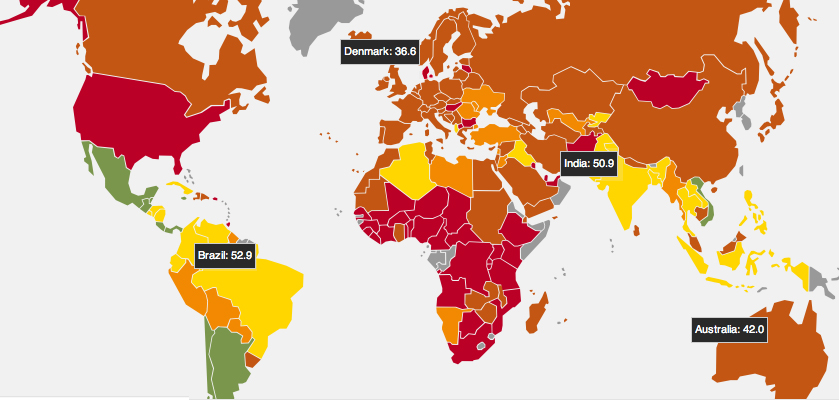The Happy Planet Index, allegedly ‘the leading global measure of sustainable well-being’, shows the extent to which countries deliver long, happy, sustainable lives for the people that live in them. The Danes rank as No 110 on the list of 151 countries.
When you rank 151 countries across the globe not only according to their economic figures, the GDP, or according to the well-being of the population, the World Happiness Report, but instead take a combined look at their efficiency and how many long and happy lives each produces per unit of environmental output, you get a very different “world order” of which countries are ahead of which nowadays.
Costa Rica and Vietnam are world leaders.
Brazil comes up as No 21.
India as No 32.
Australia is 76, while the Danes rank close to the bottom – as 110.
The Danes have heard so many times that according to research, they are allegedly “the happiest people on the planet” that they are beginning to think it must be true. But hey, what good is it to be top-happy and content, when the planet is not happy and consequently begins to create climate catastrophes, which eventually are bound to have an influence on that temporary, short-lasting feeling of happiness?
So here is a new index which not only looks at people’s experienced well-being but also takes into account how well they take care of the environment, the CO2-emissions, and the environment — their so-called ‘ecological footprint’.
Assuming that the research and the data of the index is correct, there’s some real food for thought here for the Danes. They end up as No 110, because of a lousy ecological footprint. As far as their ecological footprint is concerned, Denmark ranks as low as country No 147 among the 151 countries, only doing slightly better than the four last on the list, where are United Arab Emirates, Kuwait, Luxenburg and Qatar.
Check it out here.
The scores for the index and the component measures can be viewed in map or table-form. By clicking on any individual country in the map or table you can explore its results in more detail.
Related
“How can we talk about happiness if you kill the very thing that is the source of our sustainance? There is no GDP calculation of the services of a butterfly.”
Bittu Sehgal, Editor, Sanctuary Asia and Sanctuary Cub Magazines
International Day of Happiness
“A profound shift in attitudes is underway all over the world. People are now recognising that ‘progress’ should be about increasing human happiness and wellbeing, not just growing the economy at all costs.
That’s why all 193 United Nations member states have adopted a resolution calling for happiness to be given greater priority and 20 March has been declared as the International Day of Happiness — a day to inspire action for a happier world.
The creation of the International Day of Happiness followed on from the first ever United Nations conference on Happiness and Wellbeing and an earlier UN resolution calling for member states to place a greater focus on the happiness of their citizens. In July 2012, the United Nations General Assembly adopted Resolution 66/281 which decreed that the International Day of Happiness would be observed every year on 20 March. Each year, on this date, a universal phenomenon occurs. The sun is on the same plane as the earthʼs equator so that day and night are of equal length, creating balance in the earthʼs celestial coordinate systems.
Creating a happier society requires action at all levels — not just from political leaders and institutions but also from us as individual citizens. When we do things to bring happiness to others, everyone benefits. It helps the people we connect with, boosts our own well-being and also inspires others to be more caring and positive too.
Wherever you are in the world you can take part on the International Day of Happiness by sharing what you’re doing on the day using the #happyday hashtag on Twitter.”
Source: actionforhappiness.org

